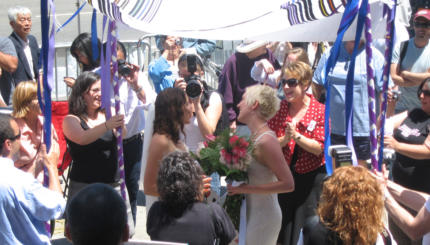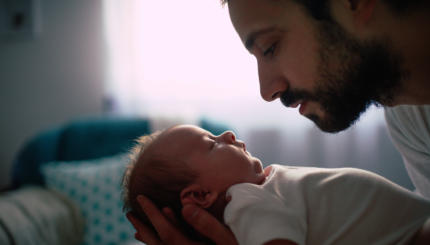Reprinted with permission from The United Synagogue Review.
Grandparents have a unique relationship with grandchildren because in most situations they do not deal with day-to-day responsibilities. Grandparents can be selective in what the focus of their time spent together will be. Grandchildren are often particularly receptive to these occasions since they are special and out of the ordinary. It is thus possible to share one’s knowledge and experiences and to relate personal views which can strengthen a child’s understanding of Jewish traditions.
Creating Jewish Identities
In some instances, grandparents may walk a fine line if their religious, social, or political views differ from those of their own children. In that case, grandparents have an obligation to respect such boundaries, yet remain true to their own beliefs. Adding geographical distance nudges us to more specifically determine our roles and our limitations.
Judaism does not take place only in the day school, synagogue or synagogue school. Judaism “happens” during the family time of a Friday night Shabbat dinner, at the blessing of the children, in the magic of the Hanukkah candles, or in the smell of fresh-baked hamantaschen. By dropping a coin in the tzedakah box, or sending a card–or paying a visit–to a sick friend–we are helping to shape Jewish memories and create Jewish identities.
In like manner, learning “happens” at expected, and often at unexpected, times. Sitting at the seder table, our granddaughter responded to the question of what the Pesah celebration was all about. She asked if she could put on a play. Moments later, she returned with several scarves and items from her dress-up box and a baby Moshe basket and seder plate (made at her synagogue nursery school). In her own words, she told of yetziat mitzrayim, the exodus from Egypt–of how we were once slaves but now we are all “really” free. She told us: “A voice came out from the burning bush and said, ‘Take off your shoes! You are standing on holy ground.'” Her story was “illustrated” with songs accompanied by movement–“Baby Moshe,” “The Frogs” and “Let My People Go–No, No, No!” Her big brother chimed in and added an original Hillel Sandwich song from his kindergarten class at his Solomon Schechter Day School. Her performance was fairly brief (15 minutes), but her words taught us all a good deal.
Teaching by Example
Grandparents can help pass down, and create, Jewish experiences for their grandchildren. Focusing our impact takes planning and thought. When grandparents discuss Judaism, it should be natural and relaxed. One needn’t be a Jewish scholar to discuss the true meaning of Judaism as a way of life. It is appropriate for grandchildren to know that their grandparents continue to learn, to study and to grow.
As role models, we must take seriously the religious component of our own lives. We need to recognize that the goals we embrace in the religious education of our children ought to make us look seriously into our own beliefs. After all, we can’t tell our grandchildren about something we don’t do. In addition to synagogue attendance and home observance, there are many opportunities to do volunteer work and perform gemilut hasadim, acts of loving-kindness. In all our communities across North America, there are opportunities galore to continue to study Torah and Jewish texts with rabbis, scholars and knowledgeable Jews.
Today, even isolated communities are within reach of “distance” learning, via the computer and videotapes. There are many excellent books that can assist in telling the story of the Jewish people. Our response to the challenge of how we bind our grandchildren to their Jewish heritage is the one that has been used throughout the ages–we bind ourselves to our history, our land, our God and to one another by learning and teaching Torah.
Parents and grandparents teach by example. What a child sees, at any age, can convey as much to that child as a planned activity. Preparing for Shabbat and holidays together, jointly volunteering at a nursing home or soup kitchen, making bikkur holim visits to the infirm or working on a family genealogy project help transmit Jewish experiences and values.

I never knew my grandparents. Both maternal and paternal grandparents perished in Europe. My parents often spoke of them and passed along stories and their favorite sayings. I often find myself contemplating what nahas they would have had from my family, from me. For them, their Jewishness brought war and worse. For my parents, brothers and me, America granted religious freedom to be anything we wanted to be and to do anything we wanted to do. I imagine their delight in knowing their grandchildren and great grandchildren have become Jewish educators, rabbis, cantors and teachers (and a few doctors, too!); that our lives are richer and more meaningful because of our Jewishness. And I continuously contemplate how to most effectively pass these emotions on to our own grandchildren.
Ah, but first I hit #1 on my speed dialing program. It is 8 PM and five-year-old Benjamin answers the phone and says he’s ready to be tucked in for the night. I am quite ready. He takes the portable phone into bed with him and I tell him a bedtime story. (Sometimes, these are his favorite books, but often they are created “on the spot” and tend to be pedagogic but fun.) Next, we sing one or two songs (his choice). And then when he says the shema and recites ve-ahavta, no matter how many times we’ve done the routine, my eyes swell up with tears. I am struck with awe and wonder and feel God’s presence. The words may be coming from his lips, but they are uttered with the blessings and love of many generations.
Ideas for Long-Distance Grandparenting
Photo exchange–Disposable cameras make this a project anyone can do. Continuously snap photos of both formal and informal occasions, then develop two sets, send one, and save the other. Keep a scrapbook and enjoy!
GTV (Grandparent Television Videos)–Become an actor, tell a story, videotape a hallah-making production or other cooking session. Turn the camera on during conversations at the dinner table or in the living room. Take the video camera with you on a walk through the neighborhood to visit places of Jewish interest.
Audio-cassettes–Prepare a quiet-time listening tape by reading an age-appropriate Jewish book or by recording your favorite musical selections.
Progressive art projects–Start a Shabbat mural by sending everyone in the family a sheet of 8″ x 10″ paper. Using crayons, paints or felt markers, draw your favorite Shabbat symbol. Set a deadline and ask everyone to send their drawings back to you. Tape together and display for your next family gathering. Periodically change the theme of your family mural. Try birthday and holiday celebrations, tikkun olam or many others.
Love notes and packages–Periodically send little treats. Try home-made goodies such as mandelbread or hazenblozen and enclose your recipe on a pretty index card.
Take a photo and tape it to the center of a circle. Hole-punch the top and thread yarn through it so that it may be hung as a mobile, or on a wall hook or door-knob.
To adapt a Yiddish saying, “One who engages in parenting/grandparenting for one hundred and twenty years will live a long life!”

Help us keep Jewish knowledge accessible to millions of people around the world.
Your donation to My Jewish Learning fuels endless journeys of Jewish discovery. With your help, My Jewish Learning can continue to provide nonstop opportunities for learning, connection and growth.
Moshe
Pronounced: moe-SHEH, Origin: Hebrew, Moses, whom God chooses to lead the Jews out of Egypt.

Help us keep Jewish knowledge accessible to millions of people around the world.
Your donation to My Jewish Learning fuels endless journeys of Jewish discovery. With your help, My Jewish Learning can continue to provide nonstop opportunities for learning, connection and growth.
Torah
Pronunced: TORE-uh, Origin: Hebrew, the Five Books of Moses.

Help us keep Jewish knowledge accessible to millions of people around the world.
Your donation to My Jewish Learning fuels endless journeys of Jewish discovery. With your help, My Jewish Learning can continue to provide nonstop opportunities for learning, connection and growth.


